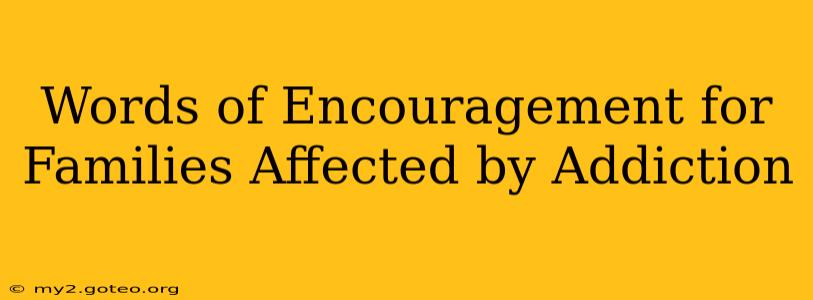Addiction is a devastating disease that impacts not only the individual struggling but also their entire family. The emotional, financial, and relational toll can be immense, leaving family members feeling lost, hopeless, and alone. This article offers words of encouragement and practical advice for families navigating this challenging journey. Remember, you are not alone, and recovery is possible.
What are some helpful things to say to a family member struggling with addiction?
This is a crucial question, and the answer hinges on empathy and understanding. Avoid judgmental language or phrases that place blame. Instead, focus on expressing your love and unwavering support. Here are some examples:
- "I love you, and I'm here for you, no matter what." This simple statement conveys unconditional love and support, which is paramount during difficult times.
- "I'm worried about you, and I want you to get help." Expressing concern demonstrates care without being overly critical.
- "What can I do to help you?" This empowers the individual to voice their needs and takes the pressure off you to have all the answers.
- "I understand this is difficult, and I'm here to listen without judgment." Creating a safe space for open communication is vital.
Avoid saying things like:
- "Just stop!" Addiction isn't a matter of willpower; it's a complex disease requiring professional help.
- "You're ruining your life!" This type of accusatory language is counterproductive and may push the individual further away.
- "I'm so disappointed in you." While feelings of disappointment are valid, expressing them in a critical manner can be damaging.
How can families cope with the stress of a loved one's addiction?
Coping with the stress of addiction within the family requires a multi-faceted approach focusing on self-care, support systems, and education.
-
Prioritize Self-Care: This is crucial. Engage in activities that nourish your physical and mental well-being, such as exercise, healthy eating, mindfulness, and spending time with supportive friends and family members. Consider therapy or support groups to help process your emotions.
-
Build a Strong Support System: Connect with others who understand what you're going through. Al-Anon and Nar-Anon are excellent resources offering support groups specifically for families affected by addiction. Talking to a therapist or counselor can provide additional guidance and support.
-
Educate Yourself About Addiction: Learning about the disease of addiction can help you better understand your loved one's struggles and how to support them effectively. This knowledge can also help dispel myths and reduce feelings of guilt or shame.
-
Set Boundaries: Establishing healthy boundaries is vital for protecting your own well-being. This might involve limiting contact with the addicted individual during periods of relapse or risky behavior. Remember, setting boundaries isn't about rejection; it's about self-preservation.
How can I help my family member find treatment for addiction?
Helping a loved one find treatment often requires a collaborative approach. Here are some key steps:
- Research Treatment Options: Explore various treatment options, including inpatient and outpatient programs, therapy, and medication-assisted treatment. Consider their specific needs and preferences.
- Have an Intervention: A professionally guided intervention can be highly effective in persuading an addicted individual to seek treatment. It provides a structured environment for family members to express their concerns and encourage treatment.
- Support Their Treatment: Once treatment begins, actively support their recovery journey. This could involve attending family therapy sessions, providing transportation to appointments, or simply offering emotional support.
- Celebrate Milestones: Recognize and celebrate their achievements along the way. Recovery is a process, and acknowledging progress reinforces positive behavior and motivation.
What is the long-term outlook for families affected by addiction?
The long-term outlook for families affected by addiction depends on several factors, including the individual's commitment to recovery, the family's ability to cope with the stress, and access to appropriate support services. While the journey can be challenging, recovery is possible. With sustained effort, families can rebuild their relationships, heal emotional wounds, and create a healthier future. Remember, seeking professional help and relying on your support system are crucial components of long-term success.
Are there any long-term effects on children whose parents have struggled with addiction?
Yes, children exposed to parental addiction often experience long-term effects. These can include emotional and behavioral problems, difficulties in school, substance abuse issues later in life, and challenges in forming healthy relationships. Early intervention and ongoing support are crucial to mitigating these potential effects. Therapy for children, family therapy, and access to support groups like Alateen can prove immensely beneficial.
This article offers general advice and doesn't substitute professional medical or therapeutic guidance. If you or a loved one are struggling with addiction, please seek help from a qualified healthcare professional or addiction specialist. There are resources available to provide the support and guidance you need. Remember, hope is always available, and recovery is possible.

